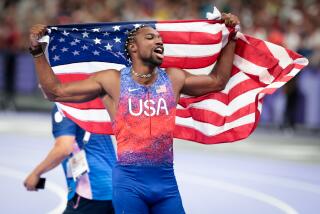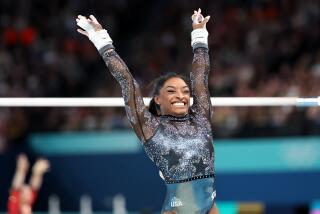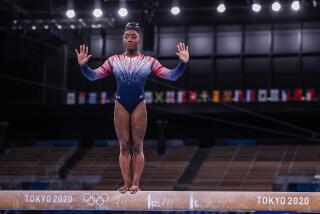The Seoul Games / Day 3 : Boxing : Banks’ Knockout a Stunning Blow to U.S.
- Share via
SEOUL — In the aftermath, U.S. amateur boxing officials were calling it the biggest Olympic shocker for the United States since 1972, when Duane Bobick was smashed to the canvas by the pounding fists of an unknown Cuban heavyweight named Teofilo Stevenson.
Kelcie Banks, 23, the United States’ most decorated amateur boxer, was knocked out of the Olympics by one short punch from a Dutch featherweight, 1 minute 50 seconds into the first round Sunday night.
Banks, who was unconscious for more than 1 1/2 minutes, was on the canvas for almost three minutes and spent the night in a Seoul hospital to be checked out, U.S. doctors said.
When short, stocky Regilio Tuur crashed a right fist onto the tip of Banks’ chin, about 50 Dutch spectators in Chamshil Students’ Gymnasium leaped to their feet, cheering, and a Dutch flag went up, waving.
And down came the American flag that U.S. light-heavyweight Andrew Maynard had been waving at ringside in Banks’ behalf.
Banks, the reigning world amateur featherweight champion as well as the Pan American Games champion, saw none of this.
His exit from the Olympic boxing tournament was as ironic as it was shocking.
On Friday, at the U.S. Olympic boxing team’s final press conference, Banks said the only way he would fail to win the gold medal would be if he was carried out feet first.
“They’re going to have to knock me out cold , and I do mean cold ,” he said, gesturing with a judo chop with his right hand.
“I don’t mean knocking me down two or three times. . . . I mean knocking me out cold . That’s the only way I’m going to lose here.”
Banks’ defeat followed Arthur Johnson’s opening-bout victory Sunday morning. At Los Angeles in 1984, the U.S. team won its first 16 bouts before bantamweight Robert Shannon was defeated by South Korean Moon Sung-Kil.
One shocked television viewer was Pat Nappi of Syracuse, N.Y., a three-time Olympic team coach who has coached Banks in many international engagements.
“The kid just got caught,” Nappi said.
“Kelcie has a lot of heart, so when he stayed down, you knew he was really hurt. I’ve seen him get off the deck before and win. He’s had a tendency to carry his hands too low in the past, but I thought he had his left hand up (Sunday night). He just got caught.
“Yeah, I’d have to say that’s the biggest upset loss we’ve had in the Olympics since Bobick.”
So Banks’ 11-year dream of winning an Olympic gold medal ended in an instant. And for many in U.S. amateur boxing, Tuur’s thunderbolt evoked no tears.
Banks is a nonstop talker, and his most frequent theme is himself.
He passes out business cards that read: “Kelcie ‘Mr. Mix’ Banks, World Amateur Featherweight Champion.”
At boxing tournaments, he has been known to show up with 8-by-10 portrait photos of himself, which he autographs and passes out. When reporters have asked for an interview, he has been known to reply: “Sure, but first you should read my portfolio, so you can read about all the championships I’ve won.”
In Houston, where he moved from Chicago two years ago, he boxed for the Houston Boxing Assn. and was a weekly guest on a radio talk show.
So for years, many U.S. boxing officials have not-so-secretly waited for the day when Banks would get knocked right on his portfolio.
But no one was prepared for this, for the suddenness of it all.
The relatively obscure Tuur, 21, is a tennis player whose parents are from Suriname but who was born in Rotterdam. He wants to move to the United States and become a professional boxer. That punch Sunday night won’t hurt his chances.
At the 1987 European Championships, he lost a 5-0 decision to Amikhak Kazarian of the Soviet Union, but that defeat was at 132 pounds.
His short, straight right hand caught the taller Banks as he was moving in. His long legs sagged immediately, and he toppled backward, his head bouncing sharply on the mat as he landed.
Several of Banks’ teammates, seated near ringside, sat in disbelief at the sight of Banks lying motionless on his back. The disbelief quickly turned to fear when it became apparent that Banks was unconscious.
“He was unconscious for over a minute and a half,” said Dr. Robert Voy, medical officer for the U.S. Olympic Committee, who attended Banks immediately after he went down.
“That’s why he went to the hospital. AIBA (International Amateur Boxing Assn.) rules call for automatic hospitalization for anyone knocked out for over a minute and a half.”
Banks stayed overnight in Young Dong Hospital, checked out normally in a CAT scan, and was to be released Monday morning.
Dr. Joe Perlman, the USOC physician assigned to the boxing team, pronounced Banks shaken but unhurt.
“Kelcie seems to be fine, but they’ll check him out at the hospital,” he said. “He never stopped breathing while he was out. I spoke to him as he left for the hospital. He doesn’t recall what happened.”
Tuur had hit Banks on the chin with glancing blows twice before the knockout blow. In hindsight, they could be called warning shots, but they went unheeded. Banks’ hands remained low.
The 5-foot 11 1/2-inch Banks towered over his 5-6 opponent, who bore an uncanny resemblance to Ed Hopson, the U.S. boxer who caused the left-handed Banks so much grief at the Olympic team box-off at Las Vegas in July.
Hopson, from St. Louis, lost to Banks at the Olympic trials tournament and the box-off, and he complained about both decisions. So did a lot of other observers, who felt Banks had been gift-wrapped onto the Olympic team.
USA Amateur Boxing Federation officials said at the time that Hopson, who tends to commit numerous fouls for ducking (ducking below the belt is a violation) and hitting the back of the head, would be a high risk to be disqualified at the Olympics.
Hopson, 17, was a whirling dervish-style puncher. Tuur, although of similar dimensions, was more disciplined, more controlled. Looking up, he obviously had an unobstructed view of Banks’ chin.
Afterward, he didn’t want to talk. His coach toweled him off, and the two went straight to the athletes’ bus, and then rode off to the Athletes Village.
Ken Adams, the U.S. boxing coach, could only shrug.
“Some punches you never see,” he said.
“Obviously, Kelcie never saw that one. It was dead on the money, too. By the time he got to the corner, he still didn’t have his legs under him. Kelcie and I had talked a lot about keeping his hands up, and he didn’t. And remember, he was walking into the direction of that punch.”
It probably will be a long time before anyone in the U.S. Olympic boxing program will forget the sight of Kelcie Banks, flat on his back, in Seoul.
More to Read
Go beyond the scoreboard
Get the latest on L.A.'s teams in the daily Sports Report newsletter.
You may occasionally receive promotional content from the Los Angeles Times.










